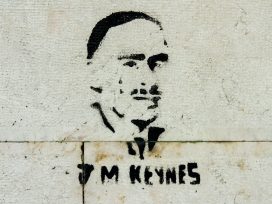John Maynard Keynes and Friedrich von Hayek published their landmark works over 75 years ago, so why do their ideas still generate such debate today? Kritika & Kontext devotes a special issue to a re-evaluation of these two 20th-century behemoths in economic thought – one a staunch advocate of government intervention in markets, the other a standard-bearer for unfettered entrepreneurial capitalism.
A series of essays and profiles of the two thinkers attempts to debunk some of the enduring myths and misunderstandings regarding Keynes and Hayek’s relationship and ideas, as well as to reinterpret them for the contemporary paradigm. As Bradley W. Bateman’s editorial points out, the persistent debate over the merits of the ideas articulated by these two thinkers demonstrates their continued relevance in a world in which ‘there is little agreement about what an effective capitalism requires’.

At the heart of the issue is an essay written by the American economist Steven G. Medema in response to a discussion by leading intellectuals and politicians in the field centring on eight questions about the influence of Keynes and Hayek. The questions deal with a range of issues relating to modern-day capitalism and economic policy, from market instability and income inequality to government responses to the 2008 financial crisis and COVID-19.
Medema reflects on the way in which the two economists are today consistently weaponised in an ongoing ideological debate between left-wing intellectuals and proponents of neoliberalism, in which they are presented as avatars of each respective position – often in a superficial manner that misrepresents the complexity of their theories.
‘Keynes and Hayek have become, in our age, emblematic of – indeed, poster-children for – these latest turns, victims of the inexorable urge to depict economic life in terms of market vs. state. We arrived at this point via a historiography where close reading is sacrificed to caricature, and nuance cannot be allowed to get in the way of a good story’, writes Medema, adding that ‘neither Keynes nor Hayek would recognize the person so labelled by many of their critics, or even by many of their ostensible disciples’.
Medema sees the notion that either Keynes or Hayek alone offers the answers to the challenges society faces as ‘absurd’ and calls for us to adopt an ‘intellectual eclecticism that is, and perhaps always has been, all too rare’. ‘The uncomfortable truth’, he writes, ‘is that reality in turn stomps on and vindicates the ideas of both Hayek and Keynes; we disregard each at our peril’.
Deconstructing Aunt Sally
In his essay ‘A composite Aunt Sally of uncertain age’, Bradley W. Bateman notes that many current discussions of Keynesian economics tend to be based on misconceptions that place the debate on unsteady ground from the outset.
‘The figure confidently referred to as “Keynes” often turned out to be an ahistorical abstraction, located not in the context of actual arguments over policy or of actual debates over theory, but with citations from his various writings, of various dates, pressed into service in senses which could hardly have been intended,’ explains Bateman.
Acknowledging the legitimacy of a debate between Keynes and Hayek, he stresses that this debate must be ‘between an historically accurate Hayek and an historically accurate Keynes’. Only then can we parse the ‘economic, methodological, and moral difference’ and draw useful conclusions that are relevant to us today.
Bateman argues that the ‘Aunt Sally’ used so often to depict Keynes is based on a number of key misunderstandings about his ideas on fiscal and monetary policy – and their implementation in the wake of the Great Depression – and that in fact the economist (often painted as a socialist) had much in common with Hayek, who himself is frequently misrepresented as an ‘anti-state “barbarian”’ with no interest in a welfare state.
Two imperfect systems
In ‘Using Hayek to Defend Keynes’, Roger E. Backhouse echoes Bateman’s argument that Keynes and Hayek should not necessarily be seen as espousing opposing ideologies. ‘Hayek’s most important arguments in economic theory can, paradoxically, be used to support Keynesian conclusions’, he argues.
While Backhouse concedes that Hayek’s ideas about markets as information-distributing mechanisms discredits centrally planned economies, he highlights that there are also theoretical flaws in Hayek’s theory that allow it to be seen as a critique of markets.
‘There is good reason to believe that a planned economy without markets and without prices will generally be inefficient for the reasons identified by Hayek. But individualistic capitalism is also likely to be inefficient’, he writes. ‘Evidence on how different systems work out in practice needs to be found’.
Review by Alastair Gill







